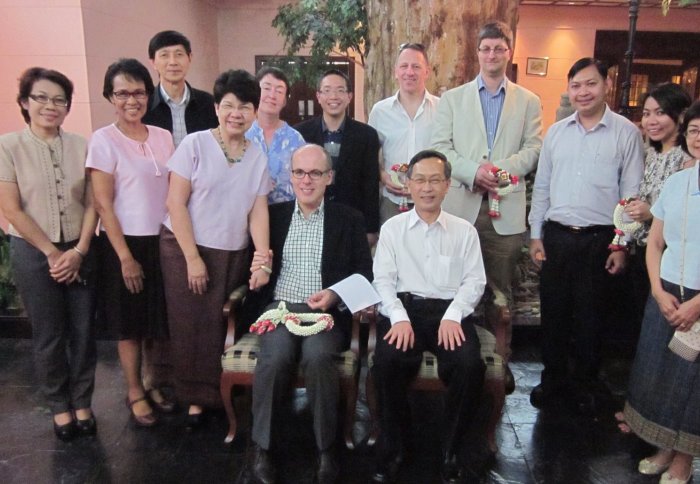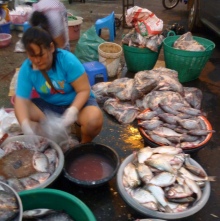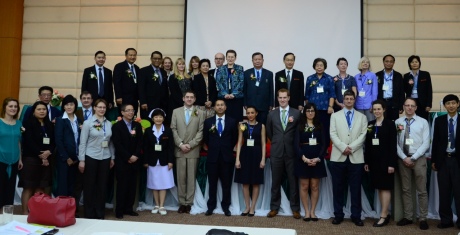Sharing the disease burden of Cholangiocarcinoma in the UK and South East Asia
by Jo Seed

Members of Imperial visited Khon Kaen University last week to host seminars & discuss ways to combat Cholangiocarcinoma, a cancer of the bile ducts.
Imperial College London and Khon Kaen University in Thailand hosted a series of workshops and seminars last week on the disease burden of Cholangiocarcinoma (CCA). Funded by the British Council, the event offered the opportunity to conduct face to face meetings and discussions on how best to collaborate to prevent this highly fatal disease.
The prevalence of CCA is increasing worldwide and early diagnosis is not possible, which contributes to a high mortality rate. CCA occurs in both Thailand and the UK and whilst it kills approximately 1500 people annually in the UK, it is responsible for more than 25,000 deaths per year in north-east Thailand.
 Primary sclerosing cholangitis (PSC), a rare chronic liver disease, is the commonest known factor for CCA in the UK. In Thailand however, it is strongly associated with infections from liver fluke– parasites which occur in the bile ducts, gallbladder, and liver as a result of eating raw fish.
Primary sclerosing cholangitis (PSC), a rare chronic liver disease, is the commonest known factor for CCA in the UK. In Thailand however, it is strongly associated with infections from liver fluke– parasites which occur in the bile ducts, gallbladder, and liver as a result of eating raw fish.
Due to the immense disease burden of CCA, Khon Kaen University (KKU) established the Liver Fluke and Cholangiocarcinoma Research Centre to conduct relevant research to alleviate this problem. Imperial’s visit to their site provided an opportunity to engage with the Centre and brought together biologists, parasitologists, clinicians, statisticians, nurses, engineers and materials scientists, among others to share their knowledge and experience on the subject.
Keynote talks were given by Professor Debra Humphris, Vice-Provost (Education) at Imperial College London, Mrs Helen Morement, Head of Cholangiocarcinoma charity AMMF, Professor Simon Taylor-Robinson, of Imperial’s Wellcome Centre for Global Health Research (WCGHR) and Professor Pisake Lumbiganon, Dean of the Faculty of Medicine at Khon Kaen University. Sr Mary Crossey also led a nurse workshop on nurse-led models of healthcare, which are highly relevant to low- and middle-income countries.
Representatives from IGHI, The Centre for Digestive and Gut Health and WCGHR contributed to a number of topics. These included the epidemiology of CCA and the science behind it, the role of liver flukes as risk factors for cancer, the causes of CCA and how it develops, the diagnosis and treatment, and palliative care requirements for those suffering CCA.
During the visit, field trips were arranged in order to observe the environmental conditions in endemic communities. This included a hospital tour, where they were able to observe patients and care facilities in the CCA ward at Srinagarind, the Khon Kaen University hospital.
Key areas of collaboration were identified including engineering projects to improve imaging diagnostics (Professor Richard Syms), biomarkers for early disease detection (Professor Elaine Holmes), the gut microbiome (Dr Julian Marchesi), collaboration on nurse-led models of healthcare delivery (Sr Mary Crossey) and on surgical training (through the Hamlyn Centre for Robotic Surgery).
There is a very important role for education not only to share knowledge but to build skills and capacity to develop the workforce.
– Professor Debra Humphris
Vice-Provost (Education) at Imperial College London
Professor Debra Humphris, Vice-Provost (Education) at Imperial College London said, “It has been a real privilege to be part of this meeting. Working with colleagues from KKU, it has highlighted the need for biologists, parasitologists, clinicians, statisticians, nurses, engineers and materials scientists to work together to address this urgent and significant health issue. There is a very important role for education not only to share knowledge but to build skills and capacity to develop the workforce. I look forward to watching this collaboration grow and make a real impact on what is a significant global health issue.”
Professor Pisake Lumbiganon, Dean of the Faculty of Medicine at Khon Kaen University said “This workshop has been a very successful scientific meeting. We are certain that the experiences and knowledge shared among researchers from the UK and Thailand will lead to potential future research projects that will finally benefit people from all parts of the world. We are very much looking forward to future fruitful collaborations between our two institutions”.
Professor Simon Taylor-Robinson of Imperial’s Wellcome Centre for Global Health Research (WCGHR) said, “It was a great honour to visit KKU and I hope this will be a long lasting relationship. We hope that this will be the first of many exchanges through the Wellcome Global Centre and Imperial’s Institute of Global Health and Innovation.”
View more photos from the visit here

Article text (excluding photos or graphics) © Imperial College London.
Photos and graphics subject to third party copyright used with permission or © Imperial College London.
Reporter
Jo Seed
Institute of Global Health Innovation